The hearings of the Commissioners-designate start today in the European Parliament
euinside, January 11, 2010
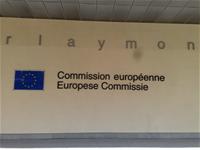 The hearings of the European commissioners-designate start today in the European Parliament's committees. They will continue until the 19th of January. The hearing of the Bulgarian designate - Ms. Rumyana Zheleva - will be on the 12th of January from 1630 CET. It is expected the examination to last around 3 hours. The final vote of the entire second Commission of president Barroso will be on the 26th of January if all candidates perform well at the hearings in the committees.
The hearings of the European commissioners-designate start today in the European Parliament's committees. They will continue until the 19th of January. The hearing of the Bulgarian designate - Ms. Rumyana Zheleva - will be on the 12th of January from 1630 CET. It is expected the examination to last around 3 hours. The final vote of the entire second Commission of president Barroso will be on the 26th of January if all candidates perform well at the hearings in the committees.
All 26 designates sent their written answers to the 5 standard questions of the members of the European parliament before Christmas. The questions are the same for all 26 commissioners but at the hearings in the parliamentary committees they will be much more detailed. Usually the hearings are a very serious test for the candidates who are not very well prepared for the field they were chosen to work in.
When the previous Commission was being formed, there were some shifts - the Hungarian designate Laszlo Kovach was nominated for energy but he failed at the hearings in the energy committee in Parliament because of the total lack of experience in the energy field. He ends his term as a commissioner on taxation. There was a problem with the Italian nomination too - Rocco Buttiglione because of his statements that homosexuality was a sin. Buttiglione was nominated by Italy to become a commissioner for justice and home affairs but was replaced by the then-foreign minister Franco Frattini who then became a close friend of Bulgaria.
The written questions are 5 and give the designates an opportunity to present their professional experience and to explain how this experience of theirs would help them in their future work. The candidates must also describe 3 of their major priorities as well as their legislative plans. With this the MEPs want to check whether the designates are well informed about the institutional organisation and how would they cooperate with Parliament.
euinside will present to you the visions of all commissioners-designate but we will start first with those whose fields are directly related to the new position of high representative for external relations and security of Lady Catherine Ashton. Those are Enlargement and Neighbourhood policy, Development Policy and the portfolio of the Bulgarian candidate - Humanitarian aid, crisis reaction and international cooperation.
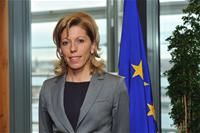 The Bulgarian foreign minister Ms Rumyana Zheleva has tried to convince the MEPs that she is suitable for the position because she grew up in a country where people had fought for freedom and democracy for decades and that is why she had always believed in Europe and the common cause. She also quotes her experience as a foreign minister. She became such in July 2009 but she hopes that her education in sociology and her experience as a professor would also help her in her work.
The Bulgarian foreign minister Ms Rumyana Zheleva has tried to convince the MEPs that she is suitable for the position because she grew up in a country where people had fought for freedom and democracy for decades and that is why she had always believed in Europe and the common cause. She also quotes her experience as a foreign minister. She became such in July 2009 but she hopes that her education in sociology and her experience as a professor would also help her in her work.
Regarding her priorities, the plans of Ms Zheleva are to merge humanitarian aid and civil protection in the new portfolio "International cooperation, humanitarian aid and crisis response". According to her, there are many places around the world where the international humanitarian law is being violated and this hampers the delivery of aid to conflict and warfare zones. That is why Rumyana Zheleva intends to propose more efforts to solve this problem but without citing anything concrete.
The Bulgarian candidate for a commissioner notes a very important factor which will affect her field of work from now on quite often - the increase of the frequency and intensity of natural
disasters due to climate change is likely to accelerate. In her answers to the European Parliament Ms Zheleva writes that the international aid community is no longer in a position to effectively respond to all these disasters, therefore she will use all available instruments to increase the efforts of the EU to diminish the risk of disasters as well as the administrative capacity of local authorities in disaster prone countries.
And regarding her plans for legislative work, Ms. Rumyana Zheleva does not point any initiatives of her own. She rather quotes already available proposals of the European Commission and the Parliament for the establishment of a European Voluntary Humanitarian Aid Corps. In an interview with radio Bulgaria at the Bulgarian National Radio Rumyana Zheleva said that is was still too early to respond to the new elements of the idea for the Corps: "All consultations should take place first and then I will be able to tell you how this Corps will look like. The truth is though that the Commission should make the proposal. 2011 is the European Year of Volunteering. I had the opportunity when I was an MEP to talk about this in a plenary and as well as with regard to the position of Parliament about the announcement of 2011 as such a year".
Rumyana Zheleva graduated in sociology from the St. Kliment of Ochrida Sofia University. Later she studied economic and industrial sociology in the Bielefeld University and the Free University of Berlin. Ms Zheleva teaches sociology in the Sofia University and is also a research associate in the Sociology department of the Bulgarian Academy of Sciences. She was also a a guest lecturer of Magdeburg University, Germany. She was 1 term MEP from the EPP group in the previous parliament.
Lady Catherine Ashton has more experience than the Bulgarian nominee. She has been a 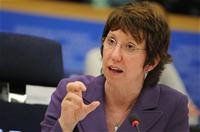 commissioner for trade for one year when she replaced Peter Mandelson who was invited in the cabinet of the British prime minister Gordon Brown in London. Separately she is a member of the House of Lords in the British Parliament for life - the upper chamber of parliament. Her first priority will be to build the European External Action Service (according to the Lisbon Treaty). The service is also known as EU's diplomatic service. She hopes the framework of the service to be ready by April when it should be proposed to the European Council for approval.
commissioner for trade for one year when she replaced Peter Mandelson who was invited in the cabinet of the British prime minister Gordon Brown in London. Separately she is a member of the House of Lords in the British Parliament for life - the upper chamber of parliament. Her first priority will be to build the European External Action Service (according to the Lisbon Treaty). The service is also known as EU's diplomatic service. She hopes the framework of the service to be ready by April when it should be proposed to the European Council for approval.
Secondly, the British nominee for the new post in the Commission promises to pull EU's weight in areas of crisis and conflict, including in the Middle East, the Balkans, Iran, Afghanistan and Africa. She will also review all operations of the Union around the world to see which are effective and which not. Another goal of Catherine Ashton would be to enhance efficient cooperation and
use of the different EU’s crisis management tools and this would be in direct coordination with the Bulgarian nominee Rumyana Zheleva.
In her written responses to the European Parliament, the candidate for high representative for the external relations and security also writes that the Afghan conflict has to be solved and the Union is committed, both with its military force but also by training police and building health and
agricultural infrastructure.
One of the good goals of Lady Ashton is her intention to reinforce EU's strong cooperation with
strategic partners such as the United States, China, Russia, India, Brazil and Japan. In her answers she admits that no matter that the cooperation with these countries is strong, there are differences with those countries.
Regarding legislative work, separately from the establishment of the external service, Lady Ashton intends to actively participate in the preparation of the new financial framework of the Union and to ask for a bigger budget for the external relations of the Union. Yet in the very beginning of her work, she will propose a draft amending budget for 2010, including amendments related to the setting up of the diplomatic service.
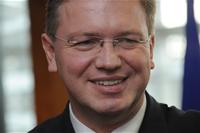 In the group of external relations field is also the field of Enlargement which in the second Barroso Commission is combined with the Neighbourhood Policy. The nominee for this position is the Czech Stefan Fuele. According to him, the perspective of joining the EU is a powerful means to encourage political and economic reform in all candidate countries. Separately, the enlargement process serves the interests of the European Union by providing an anchor of stability especially during difficult times in regions of strategic importance to the EU.
In the group of external relations field is also the field of Enlargement which in the second Barroso Commission is combined with the Neighbourhood Policy. The nominee for this position is the Czech Stefan Fuele. According to him, the perspective of joining the EU is a powerful means to encourage political and economic reform in all candidate countries. Separately, the enlargement process serves the interests of the European Union by providing an anchor of stability especially during difficult times in regions of strategic importance to the EU.
This is the reason why the main task of Stefan Fuele will be to ensure that any future accessions are solidly prepared and strengthen the Union's further development. Mr. Fuele's wish is Croatia to end the negotiations process next year if all conditions are fulfilled. Regarding the other candidate - Turkey, the Czech commissioner-designate commits to achieving further progress in the negotiations. A focus will be put on the efforts of Turkey to solve the Cyprus problem under the auspices of the UN.
Without explicitly mentioning this in his responses to Parliament, Stefan Fuele's letter shows that it is possible the Cyprus issue to be used as a leverage on Turkey to continue negotiations. It was a condition so far too but it was regularly evaded by both sides. For example the EU froze the negotiations on several chapters with Turkey but continued them on other chapters thus evading the problem.
With regard to the Neighbourhood Policy which in the first Barroso Commission was in the field of Benita Ferrero-Waldner - external relations, now it is united with enlargement. Stefan Fuele intends to reinforce the Union;s relations with the countries of the Eastern Partnership (mostly the Caucasus nations) and the south Mediterranean (Egypt, Libya, Morocco). Separately, he intends to make a differentiation in EU's relations with the Mediterranean countries, based upon the individual efforts of each country.
Andris Piebalgs, the Latvian nominee, who is going to be a second term commissioner with his current field of expertise being energy, will take the Development Policy. This is also an external 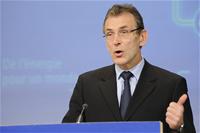 relations field. By 2015 the EU must increase its development assistance to reach 0.7% of the GDP of the Union. At the moment the EU is the largest donor of financial aid for the poorest nations by providing almost 60% of the money. The intention of Mr. Piebalgs is to guarantee that the development agenda is fully integrated into a wide range of other EU policy fields, including Environment and Climate Change, Agriculture, Energy, Education and Culture, Migration, Trade and of course the EU's wider international policy objectives.
relations field. By 2015 the EU must increase its development assistance to reach 0.7% of the GDP of the Union. At the moment the EU is the largest donor of financial aid for the poorest nations by providing almost 60% of the money. The intention of Mr. Piebalgs is to guarantee that the development agenda is fully integrated into a wide range of other EU policy fields, including Environment and Climate Change, Agriculture, Energy, Education and Culture, Migration, Trade and of course the EU's wider international policy objectives.
One of the main objectives of the Latvian candidate will be eradication of poverty and progressing towards the Millennium Development Goals of the UN. One of the ways to achieve this would be by creating conditions for economic growth and integration of developing countries into the world economy.
Many developing countries will be disproportionately affected by the effects of climate change, Andris Piebalgs writes to the MEPs and points out that these countries do not have the means to respond adequately. Building on the outcome of the Copenhagen Conference, Mr. Piebalgs will take pertinent initiatives to pursue these priorities and launch a dialogue with developing countries
on how to efficiently deliver climate-related assistance.
A very important aspect of the answers of the nominee of Latvia is his promise the EU to take the lead in the reform of global governance which should reflect the changing equilibria in the world economy while enhancing the voice and representation of developing and transition countries striking the correct balance between the legitimacy (through representativeness) and effectiveness of global institutions. More specifically, in its role of representing the EU in the G20 and as an observer at the World Bank/International Monetary Fund annual meetings, the Commission should continue to advocate the rebalancing of voting power to strengthen developing and transition countries.